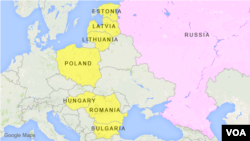A Russian official has called plans by Washington to station heavy military equipment along Russia’s borders the “most aggressive step” since the Cold War and vowed that Moscow would respond appropriately.
"If heavy U.S. military equipment, including tanks, artillery batteries and other equipment really does turn up in countries in eastern Europe and the Baltics, that will be the most aggressive step by the Pentagon and NATO since the Cold War," Russian Defense Ministry official General Yuri Yakubov said.
"Russia will have no option but to build up its forces and resources on the Western strategic front," Interfax news agency quoted him as saying.
The proposed U.S. move comes as Baltic countries and Poland, formerly in Moscow’s orbit but now members of NATO, show increasing concern about Russia's moves in Ukraine and general aggressive posturing.
"Our hands are completely free to organize retaliatory steps to strengthen our Western frontiers," Yakubov said.
A Kremlin spokesman has declined to comment on a plan. Dmitry Peskov said Monday Moscow would only respond to an official U.S. statement.
"There were no statements from the United States to that end, so I have no comment for now," Peskov was quoted by Reuters as saying.
Poland and Lithuania have confirmed that they discussed the plan with U.S. military officials in Washington last month and were reassured a decision would be made soon.
"This is another step to increase U.S. presence in Poland and the region," Polish Defense Minister Tomasz Siemoniak said.
If approved by U.S. Defense Secretary Ash Carter and President Barack Obama, the U.S. would store fighting vehicles and position as many as 5,000 troops in Bulgaria, Estonia, Latvia, Lithuania, Romania, Poland and possibly Hungary - all countries once part of the Soviet sphere of influence.
It would be the first time the U.S. has embarked on such a military presence in the region since the end of the Cold War. It is part of the NATO military alliance's plan to develop rapid deployment "Spearhead" forces to deter any further Russian interventino beyond its annexation last year of Ukraine's Crimean peninsula and a signal that the U.S. would come to the defense of its NATO allies in Eastern Europe.
The U.S. consideration of the military buildup is a response to the Crimean takeover and the West's contention that Moscow is continuing to support pro-Russian insurgents fighting Kyiv's forces for control of eastern Ukraine, an argument Russian President Vladimir Putin rejects.
"If something happens, we can't wait days or weeks for more equipment," Raimonds Vejonis, Latvia's minister of defense told The New York Times, which first disclosed consideration of the buildup. "We need to react immediately."
Last week, an opinion poll showed residents of several NATO member countries blame Russia for the Ukrainian crisis, but would be reluctant for their governments to provide military aid to Ukraine or any NATO-member country attacked Russia.
Some material for this report came from Reuters.





